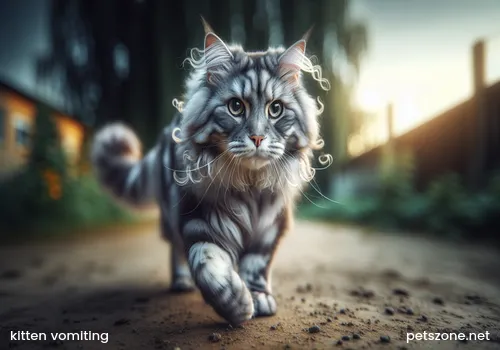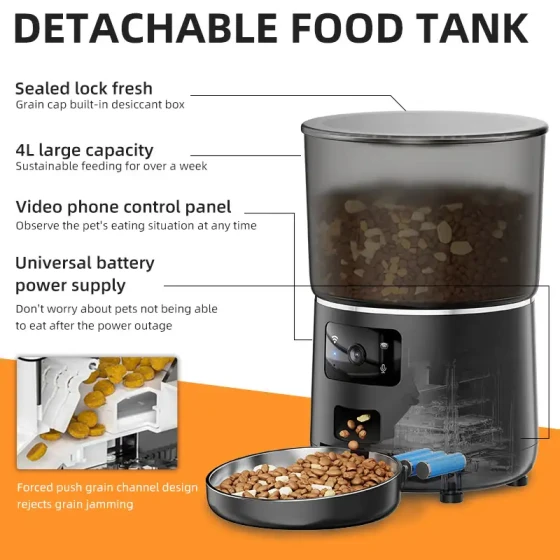What to Do If a Kitten Vomits_ Causes and Responses to Vomiting in 2-Month-Old Kittens
What to do if a kitten vomits? Especially in 2-month-old kittens, vomiting can be caused by various reasons, ranging from mild dietary discomfort to serious illnesses. When a kitten vomits, owners should first observe the nature of the vomit and the kitten's mental state. If vomiting occurs occasionally and the kitten’s spirit, appetite, and vitality are normal, it’s usually not a big problem, and home care can be tried. However, if vomiting is frequent, persists for a long time, or is accompanied by lethargy, loss of appetite, diarrhea, fever, abdominal pain, or other symptoms, the kitten must be taken to a veterinarian immediately because kittens have fragile bodies, and dehydration and electrolyte imbalance can rapidly become life-threatening.
Common Causes of Vomiting in 2-Month-Old Kittens

A kitten’s digestive system is not yet fully developed, and their stomach and intestines are relatively sensitive and fragile, so vomiting is a common sign of physical discomfort. Understanding these causes helps owners make an initial judgment.
1. Dietary Issues: Eating Too Fast, Too Much, or Unsuitable Food
- Gulping down food: Some kittens eat like "starving ghosts reborn," finishing their bowl of food in a flash, only to "regurgitate" shortly afterward. This is usually because they eat too fast or too much, causing excessive stomach burden and undigested food being vomited up.
- Sudden food change: If the brand or flavor of cat food is switched suddenly, or from wet food directly to dry food, the kitten’s digestive system may not adjust in time, causing discomfort and vomiting.
- Food allergies or spoilage: Just like people can be allergic to certain foods, kittens may also be allergic to some ingredients in cat food (such as grains, food coloring, chemical additives). Additionally, eating spoiled food can also cause vomiting.
2. Hairball Syndrome: The "Sweet Burden" of Grooming
Kittens are “little cleanliness experts” and spend lots of time licking their fur to clean themselves daily. However, the barbs on a cat’s tongue pull loose hair into the stomach. If this hair is not expelled in time, it forms hairballs in the stomach, irritating it and causing vomiting. Long-haired cats are especially prone to this problem.
3. Parasite Infection: The "Invisible Killer" for Kittens
Parasites are a common cause of vomiting in kittens, especially roundworms, hookworms, and tapeworms. Kittens may get infected from their mother or by contact with a contaminated environment. A heavy parasite load irritates the gastrointestinal tract, leading to indigestion, vomiting, sometimes accompanied by diarrhea, weight loss, or abdominal swelling. If white threadlike worms or live parasites appear in the vomit, it almost certainly indicates a parasite problem.
4. Ingesting Foreign or Toxic Substances: The Price of Curiosity
Kittens are naturally curious and want to bite and taste everything. Rubber bands, threads, small plastic pieces, toys, and even toxic plants (like lilies), chemical cleaners, or medications can be accidentally ingested. These foreign objects might block the gastrointestinal tract or the toxins can directly irritate the stomach, causing severe vomiting.
5. Stress Response and Environmental Changes: Emotions Can "Hurt the Stomach" Too
Kittens are very sensitive to changes in their environment. Moving to a new home, new family members (including new pets or visitors), home renovations, or even just a bath can stress a kitten and trigger stress-related vomiting. This type of vomiting is usually short-term and resolves once the stressor is removed.
6. Disease Factors: Signals to Watch For
- Gastroenteritis: Bacterial or viral infections (such as feline panleukopenia or feline coronavirus) may cause gastrointestinal inflammation, resulting in vomiting, diarrhea, fever, lethargy, etc. Feline panleukopenia is especially dangerous for kittens with a high mortality rate.
- Cold: Weather changes or catching a chill can cause kittens to catch a cold, possibly leading to vomiting, along with sneezing, runny nose, and coughing.
- Organ diseases: Kidney disease, liver disease, pancreatitis, hyperthyroidism, and other internal organ diseases can also present early as vomiting.
- Hypoglycemia: Because kittens have limited energy reserves, prolonged fasting or severe vomiting can cause low blood sugar, showing as weakness, drowsiness, trembling, or even seizures—a life-threatening emergency.
- Vaccine reactions: Kittens may mildly vomit or be lethargic after vaccination, usually resolving within 24 hours. However, severe vomiting or other serious symptoms require immediate veterinary attention.
How to Respond to Vomiting in 2-Month-Old Kittens
When your kitten vomits, don’t panic but observe carefully and take different measures based on the situation.
1. Carefully observe and identify the “secrets” of the vomit
The color and nature of the vomit provide important clues:
* Undigested food: Common when eating too fast, too much, or just changing food causing indigestion. The kitten is usually alert after vomiting.
* White foam or clear mucus (gastric juice): Usually due to a long empty stomach period, where excess stomach acid irritates the gastric wall, or mild gastric irritation.
* Yellow or yellow-green liquid (bile): May indicate gastric inflammation, indigestion, or bile reflux due to prolonged fasting.
* Mixed with hair: The most common sign of hairball syndrome, usually vomit contains gastric juice mixed with small tufts of hair or an entire hairball.
* Mixed with parasites: Indicates a heavy internal parasite load, requiring urgent deworming.
* Red or coffee-colored liquid (blood): Bright red may indicate esophageal injury; coffee or dark brown may indicate deep gastrointestinal bleeding (such as gastric ulcers or tumor rupture). This is an emergency needing immediate medical care.
* Mixed with foreign objects: The kitten may have ingested something inappropriate, causing irritation or blockage in the digestive tract.
2. Home care (for mild cases)
If the kitten vomits only once occasionally, with normal spirit, appetite, and activity, and no other symptoms, home observation and care can be attempted:
* Fasting: After vomiting, fast the kitten for 4-6 hours to allow the digestive tract to rest. But do not withhold water—provide plenty of fresh clean water to prevent dehydration.
* Small, frequent water feeding: If worried the kitten will drink a lot at once and vomit again, give water in small amounts multiple times.
* Diet recovery: After fasting, gradually resume feeding bland, easily digestible food. Try soaking dry food in warm water or feeding small amounts of cooked chicken breast or pumpkin puree (without seasoning), with smaller, more frequent meals. Observe 1-2 days until the digestive system adjusts before returning to normal diet.
* Clean environment: Immediately clean up vomit and keep the kitten’s living area clean to avoid accidental ingestion again.
* Comb the fur: If vomiting is due to hairballs, regularly groom your kitten, especially during shedding season, to reduce ingested hair. Consulting a vet about hairball remedies or cat grass is also advised.
* Slow feeder bowl: For fast eaters, consider using a slow feeder bowl or spreading food on a bigger plate to slow down eating and avoid gulping.
3. Immediate veterinary visit (take the kitten to the vet immediately if any of the following occur)
Kittens’ condition changes quickly; if any of these “red flag” signs appear, don’t hesitate to visit a professional pet hospital:
* Frequent or prolonged vomiting: Vomiting multiple times in one day or vomiting lasting over 24 hours.
* With other severe symptoms: Lethargy, drowsiness, loss of appetite, refusing water, weight loss, diarrhea (especially watery or bloody), fever (normal kitten temperature usually 38-39.5 °C), abdominal swelling or pain, dehydration (poor skin elasticity, sunken eyes, dry gums).
* Vomitus contains blood or foreign objects: Whether blood is bright red or coffee grounds color, or if vomit contains plastic, threads, or other foreign objects, it is very dangerous.
* Suspected poisoning: If you suspect the kitten has ingested toxic substances, immediately seek medical help even without obvious symptoms.
* Very young kitten: 2-month-old kittens have weak immunity and limited body reserves; vomiting easily causes dehydration and hypoglycemia, worsening quickly.
Veterinary Diagnosis and Treatment
At the hospital, the vet will evaluate the kitten’s clinical symptoms, vomit characteristics, medical history, etc. Possible diagnostic tests include:
* Physical examination: Assess dehydration level, mental state, abdominal palpation, etc.
* Fecal examination: Check for parasite infection.
* Blood tests: Assess overall health, presence of infection, inflammation, dehydration, electrolyte imbalance, or organ problems.
* Imaging examinations: Such as X-rays or ultrasounds to check for foreign bodies, obstructions, or organ abnormalities.
Based on the diagnosis, the vet will formulate a treatment plan which may include:
* Antiemetics: To control vomiting and relieve discomfort.
* Fluid therapy: Replenish fluids and electrolytes, correcting dehydration—especially important for kittens.
* Deworming: Use appropriate anthelmintics if parasite infection is confirmed.
* Antibiotics/antiviral drugs: Against bacterial or viral infections.
* Special diet: Recommend easily digestible prescription food or temporary liquid diet.
* Surgery: If foreign body obstruction occurs, surgery may be necessary.
Daily Tips to Prevent Vomiting in Kittens
“An ounce of prevention is worth a pound of cure.” Daily care can greatly reduce the risk of vomiting in kittens:
1. Scientific feeding:
* Feed at fixed times with small multiple meals: Avoid feeding too much at once or letting the kitten starve too long. Feed 3-4 times a day with smaller portions each.
* Choose appropriate cat food: Select specially formulated kitten food for 2-month-olds to ensure balanced nutrition and easy digestion. When changing food, do so gradually over about 7 days, mixing old and new food.
* Avoid vigorous exercise after meals: Just like humans shouldn’t exercise vigorously right after eating, kittens should avoid immediate play or roughhousing post-meal.
2. Regular deworming: Follow the vet’s advice strictly and perform internal and external deworming regularly. Kittens generally start deworming from 2 weeks old, then at intervals every few months.
3. Create a safe environment: Securely store toxic plants (e.g., lilies), small items (needles, rubber bands, plastic bags, toys), chemical cleaners, medicines, etc., to prevent accidental ingestion.
4. Provide clean drinking water: Ensure kittens always have access to fresh, clean water.
5. Regular grooming: Especially for long-haired cats, frequent brushing effectively reduces hairball formation.
6. Reduce stress: When a kitten arrives in a new environment, give it enough time to adapt and provide a quiet, comfortable, and secure space. Avoid frequent changes or introducing new members rapidly.
7. Regular check-ups: Take your kitten to the vet periodically for health checks to detect and handle potential health issues early.
Frequently Asked Questions
Q1: Why does my kitten vomit white foam?
A1: Vomiting white foam is usually gastric juice caused by a long fasting period and excess stomach acid irritating the gastric wall. If the kitten is mentally alert, it’s usually not serious and can be managed with small frequent meals. If vomiting persists or other symptoms appear, consult a vet promptly.
Q2: What to do if my kitten refuses to eat or drink after vomiting?
A2: This is a more serious condition as the kitten may quickly become dehydrated and hypoglycemic. Stop feeding, provide small amounts of water frequently, and take the kitten to the vet immediately.
Q3: Can a 2-month-old kitten eat hairball remedy?
A3: Some hairball remedies or cat grass products designed for kittens are suitable starting at 2-3 months old to help expel hairballs. It’s best to consult a vet before use to choose appropriate products and doses.
Q4: Is vomiting accompanied by diarrhea serious?
A4: Vomiting with diarrhea is usually a serious sign that may suggest gastrointestinal infection (such as panleukopenia or parasites) or more systemic diseases. Kittens easily become dehydrated from vomiting and diarrhea, so immediate veterinary care is required.
Q5: What if there is blood in the kitten’s vomit?
A5: Whether fresh red blood or coffee-ground dark blood, it indicates gastrointestinal bleeding possibly due to esophageal injury, gastric ulcers, or more serious internal problems. This is an emergency that requires immediate veterinary attention.
Summary
As an owner, seeing your beloved kitten vomit is distressing. Vomiting in 2-month-old kittens has many causes—from overeating to serious illness—and can present with varying symptoms. It is important to remain calm, carefully observe the vomit and the kitten’s overall condition as this is the first step in assessing severity. For mild vomiting, home care and feeding adjustments can be attempted; however, if vomiting is frequent, accompanied by lethargy, loss of appetite, diarrhea, fever, or blood in vomit, seek professional veterinary help immediately. Remember, a kitten’s health is as fragile as a glass cup, and even minor negligence can cause irreversible consequences. Early detection and intervention ensure your kitten grows up healthy and happy.
References
* Chewy.com. Is Your Kitten Throwing Up? Possible Causes and Treatment.
* Purina. Sickness in Kittens: Understanding and Identifying Common Kitten Illnesses.
* NetEase. Causes and Treatment of Kittens Vomiting White Mucus with Foam.
* Notes Details. Don’t Panic About Cat Vomiting | A Guide to Finding Causes and Responses!
* Vets Now. 8 Common Kitten Emergencies | Trauma, Respiratory & Vomiting.
* Colorado Animal Rescue. Vomiting and Dehydration in Kittens.
* Anan Pet Hospital. What to Do If a Kitten Vomits? Reasons for Vomiting in Just-Purchased Kittens.
* Veterinary Wellness Clinic of Columbia. How to Tell if a Kitten is Sick.
* MAMA. What to Do When a Kitten Suddenly Vomits? Vomiting Food, Vomiting Yellow Liquid or Dry Retching? Understand Causes Before Deciding to See the Doctor!
* VCA Animal Hospitals. Vomiting in Cats.
* Quora. I had about a 2 month old kitten and the kitten just recently start to vomit for about 3 days then the kitten died on the 5th day. I don't understand. Can you tell me why?
* NetEase. How to Deal with a Cat That Stops Eating and Drinking After Vomiting Hairballs?
* ASPCA Pet Insurance. Cat Vomiting Causes and Clean up Tips.
* Douban. Causes of Cat Vomiting and Home Differential Diagnosis Methods.
* Sina News. Why Do Cats Vomit Food? Common Causes and Solutions.
* Cornell University College of Veterinary Medicine. Vomiting.
* Hong Kong 01. [Cat Vomiting] Vomiting Should Not Be Taken Lightly! 4 Common Causes and Responses.
* MSD Veterinary Manual. Vomiting in Cats.
* Central Kentucky Veterinary Center. Understanding Feline Vomiting: Expert Insights from Central Kentucky Veterinary Center.
* Douban. vol.8 What You Must Know About Cat Vomiting.
* Moreson. Don’t Ask What to Do When Cats Vomit Anymore! "A Chart" Teaches You to Distinguish Vomit Color and Frequency.
* PetMD. Cat Vomiting: Causes, Types, and What to Do.
* Royal Canin. Cat Vomiting Guide! Veterinarians Teach You to Identify Causes and Handling Methods.
* OneDegree HK. Should Cats with Vomiting Visit the Doctor Immediately? Explaining Coffee Color/White Foam/Yellow Liquid.
* Chongyisheng. What to Do When Cats Vomit White Foam and Refuse Food?
* Taipei Pet Products Expo - Shanghai Lian International Exhibition Co., Ltd. What to Do When Cats Vomit? 7 Major Causes and Daily Improvement Methods All Told!
* Sichuan Veterinary Association. Potential Causes of Cat Dry Retching and Hoarseness.
* Defensive Works. What to Do If Cats Vomit? 6 Common Causes and Handling Methods.
* VEC. What to Do If Cats Vomit Yellow Liquid? Understanding Causes and Handling Methods.
* Australia YiYi Network. "Cat Vomiting is Normal, Don’t Be Nervous!"
* Cats Protection. Vomiting in cats | Help and Advice.


-560x560.webp)
